7 Things That Helped Me Pick Up Korean Quickly
 Written byThe Mez Guild
Written byThe Mez Guild- Read time12 mins
- Comments15
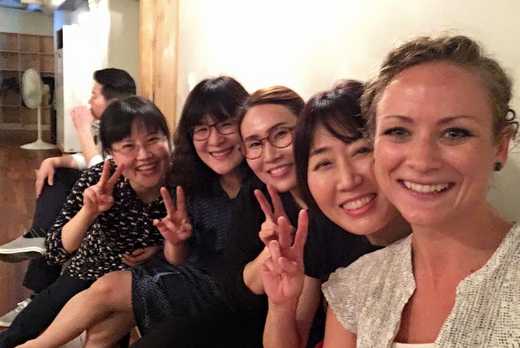
Today’s guest post comes from Kiralyn who learned to speak Korean while she was living in Daegu around the same time I was there.
She also now happens to be the woman I’m spending the rest of my life with (remember this?).
I asked her to share a little bit about her experience in Daegu and what helped her to pick up Korean so well.
Also see my list of best online Korean courses too.
Over to you, Kiralyn.
Of all the countries I’ve visited, Korea remains at the top of the list.
Maybe not for its scenery so much, but definitely for its delicious food and wonderful people.
I was concerned about learning the language before I left as I’d heard the language before and seen it written so I was totally intimidated.
I thought there was no way I could learn it!
But after being there for a year and working hard at learning the language, I was speaking it.
So here are 7 things I learned that helped me pick up Korean quickly in the year I was living there:
1. I used a flip book while out on walks, on the subway and other downtime
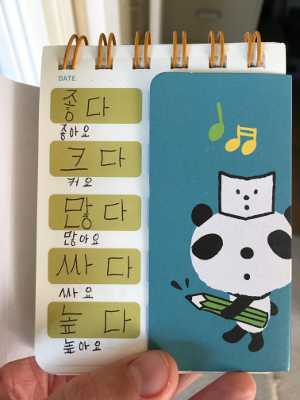
Any time I would learn a new word, it would get written down in my little vocabulary book flip book.
I would keep that little book with me all the time. It was small enough to fit in any of my purses or even my pocket so it could come with me anywhere.
My walk from my apartment to my school was only 5 minutes, but that was 10 minutes a day for me to increase my vocabulary practice.
When I was riding the subway, everyone would have their cell phones out but I’d have my little flip book. That was another 10-15 minutes of vocabulary practice. If I was meeting a friend at a coffee shop or for dinner, I’d arrive a few minutes early, grab a table, and grab my little book – another 10-15 minutes.
Making a habit out of using that book even in just a few spare minutes really added up and kept the vocabulary words at the forefront of my mind until they were engrained and I didn’t have to think about them anymore.
Over time, I would have so many vocabulary words that I needed two or three of these packs.
Every word would get written down in my book.
I also made a conscious effort to use those specific words in conversation so I could practice them.
Practicing them on your own doesn’t commit them to long term memory until you actually use them in conversation!
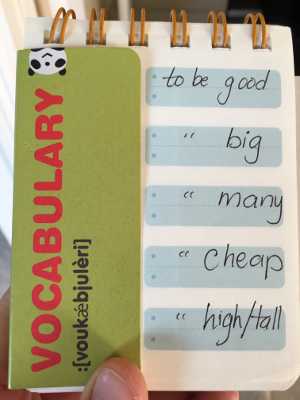
A tip for using the flip book: use it forwards and backwards.
Meaning, I had the Korean word written on the front and it was written in English on the back. That way I could translate from Korean to English.
But, I found it was just as important to flip it around and translate from English to Korean as well so I would flip my book over and do it backwards.
One more tip: I would make little pencil marks on the words that I knew for sure I had learned and regularly used in conversation – like a check. For the words that I really struggled to memorize, I would put a circle and refer back to those words more often.
Or if your pack allows, just take out the words you definitely know and focus on the ones that you stumble on.
Here’s a blank vocab pack just like the first pack I had.
2. Tell local friends to only speak Korean for constant practice
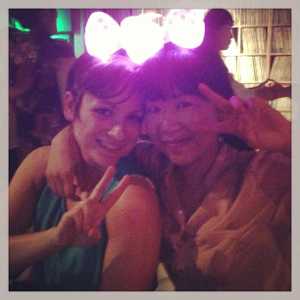
I had a wonderful group of Korean friends when I was living there. I met them through swing dancing and they just took me in.
The problem (at first) was: most of them only spoke Korean!
That really encouraged me to learn as much as I could so I would be able to communicate with them. They were always so kind to me and I really wanted to know them but at first the language barrier was such a problem.
Having people that I really wanted to speak with was so important to my language learning.
I needed that encouragement to learn and also people to practice with regularly.
There were lots of events happening with the dance group and many times the information was written only in Hangul so I had to get good at knowing words for schedules.
There were times I got it wrong and showed up on the wrong day, only to reread the information and realize I had mixed up Thursday and Friday, or something silly like that.
But again, that only helped me learn more and faster so I didn’t make the same mistake again!
There were some people in the dance group that did speak English and I would ask them sometimes how to say certain things or if I got confused about what someone else was saying, I would turn to them for help.
It allowed me to learn more because I was constantly translating and trying to understand the conversations going on around me.
One important thing I did was to ask them to try to speak as much Korean with me as possible.
I didn’t want to totally rely on them translating everything everyone said to me. That would get annoying for them and it wouldn’t help me learn.
Asking them to speak to me in Korean was incredibly helpful.
3. Join a Korean class
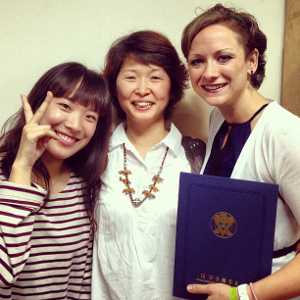
I did take classes at the local YMCA.
I took three sessions and each one lasted almost three months.
In my second session, I actually won an award for best student!
These classes really were helpful because I got to learn the language in a formal setting, which is really helpful for my learning style. We had homework each week so we had to make sure we were studying.
I also had many friends in the class so we would practice regularly with each other during the week.
My teacher was really amazing.
In the first class, she would speak slow and use simple words with lots of pictures. She basically only spoke Korean for the whole two hour class.
My head would hurt after those classes at first!
But over time, I got very used to listening only to Korean and it became more comfortable. In the second session, she again only spoke Korean but at a more difficult level so we would have to develop our skills more.
I really enjoyed taking classes as they gave me the confidence I needed to use the language more regularly.
For learning Korean online, check out 90 Day Korean as well.
4. Befriend local people who are excited to help you learn
Near my house, I had my apple lady who I would only buy my apples from and I also had my mandu (dumpling) guy who I would only buy my mandu from.
These people were so sweet and I would see them often so it was a good opportunity for me to practice with them.
When I would great them in Korean, they would get to excited!
They loved hearing me speak Korean and wanted to speak with me more.
It was a good opportunity for more practice but the best part was it allowed me to meet and talk to people that I wouldn’t normally have gotten to know.
I had a neighbor too who was so sweet.
She would always bring me homemade kimchi and the biggest smiles.
At first, I couldn’t really communicate with her but I wanted to because she was so nice but after some time, I could talk with her a little more and became more comfortable communicating.
She took me out to lunch before I left to move back to the States and it was nice to sit and chat with her and get to know her.
I love meeting people and hearing their stories, and in many places, the only way to do this is to speak their language.
5. Listen to TV and focus in on words and phrases
Korean dramas are great!

They’re cheesy and fun to watch for entertainment sake, but also for the purpose of language learning.
I would watch my favorite Korean drama (‘The Heirs’ [] was a particular favorite!) and listen in for key words or phrases I would know.
At the beginning, it would just be one word here and there and after a while, listening for a word or a phrase would turn into know a longer phrase or even a sentence.
I was so excited and really encouraged when that started happening because I could actually see progress in my learning.
6. Practice with school (or hagwon) students
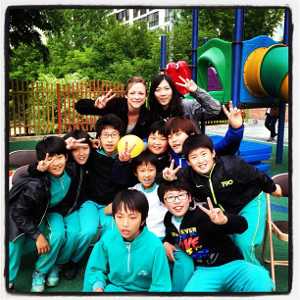
My students were so excited when I would practice with them!
If they didn’t know a word in English, I would have them say it to me in Korean and I would translate it for them (not every time, but it happened more regularly as my studies progressed).
When I told them the word, they would get so excited! “WOW teacher, so smart!”, they would say. And then I would go write the word in Hangul on the board.
It was great practice for me and really engaging for them.
Sometimes I would get it right on the first try and be met with great applause from my sweet students, and other times they would coach me on how to fix it, and still be met with applause.
Every Monday morning, I would teach my 6th grade students and since they were the oldest class I had, I would try to communicate in English with them the most.
To practice communicating, I would ask them what they did over the weekend then I would tell them what I did.
One weekend I had gone on a conference/retreat but I had no idea how to say that in Korea, so I called it a ‘meeting’. I was met with lots of “oohs” and “aahs” and googily eyes and I was so confused.
I asked my co-teacher what was going on and she said in Konglish (a blend of Korean and English language together):
“A meeting () means a group of boys and girls getting together with the purpose of dating.”
They thought I had been on a weekend long date!
We all shared a good laugh then I promptly learned the word for ‘retreat’ (and wrote it down in my flip book!).
7. Necessity makes a big difference
Sometimes there are situations where you just NEED to speak the local language.
I got sick my first month in Korea so I went to the pharmacy. I just assumed a pharmacist would speak English but the one I went to did not.
So here I am in this pharmacy doing charades with the little old Korean man and he is looking at me all confused. I just wanted some medicine and to go home and sleep but I couldn’t tell him what was wrong!
Just then, a university student came in and asked if I needed help. I told him in English what was wrong and he told the pharmacist.
He was so kind to come in but I thought later:
“What if that doesn’t happen next time I go in to a pharmacy?”
So I decided to learn some basic words for body parts and how to describe what I’m feeling.
During the summer while I was living in Korea, I went to Cambodia for a couple of weeks.
I had an amazing time but on the last day, to get from this remote village to my apartment in Korea it would take over 24 hours of travel and I’m a terrible plane/car sleeper.
I just can’t do it.
So by the time I finally made it back to my apartment in Korea, I was so excited for a shower and sleep! I made it to my front door, lifted up the key pad cover, typed in my passcode….and nothing happened!
Usually the keys turn blue and it makes a beeping noise after you type in your code and unlocks your door but mine did nothing.
I was exhausted and now desperate. I tried again and nothing happened.
I called my landlord but I didn’t know the words to tell him what was wrong and after a few minutes of failed explaining, I gave up and hung up.
I decided to sit and wait for another resident in the building to come in and ask them to call the landlord for me.
So, I just sat on the stairs and waited.
I was afraid it would take a while since it was a small building but thankfully just ten minutes later, a girl walked down and saw me and gave me a funny look (I’m sure I deserved it).
I motioned to her that my lock was not working and showed her the landlord’s number on my phone and she called him for me and explained what was going on.
She told me (in Korean) to wait two hours for it to be fixed.
So I went and had a coffee, came back two hours later and “magically” I could get into my apartment again!
I was so relieved but again, it was another lesson learned on knowing enough of the language to be able to communicate your needs!
Finally… don’t put too much emphasis on reading and writing
One thing I would advise against is focusing too much on reading fluency, comprehension, and writing.
I wish I had just focused on speaking during my first year there.
I feel like my spoken language would have been even better had I spent less time on being a fluent reader and being able to write well in Korean.
If I had taken the time I used on practicing reading and writing and used that time to practice speaking with people instead, I could have become more fluent and committed more of the language to my long term memory.
Reading is important, but just the basics. Read the subway signs, read the menus in restaurants, but reading stories and building comprehension?
Too much.
I wish I had just focused more on conversation, but now I know for the next language I learn!
 Grab the link to this article
Grab the link to this article